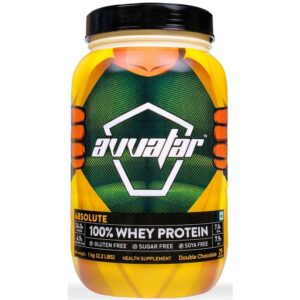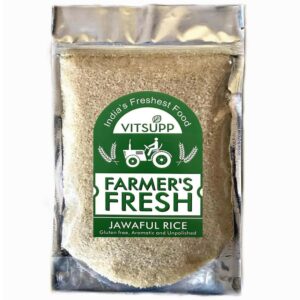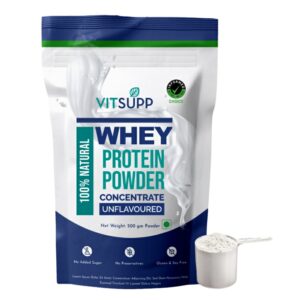Whey protein powder has become popular because of its remarkable nutritional profile and adaptability. But is Whey Protein Powder Good for Health? Whey protein was once only a byproduct of cheese-making, but it has since become a popular supplement among bodybuilders, athletes, and health enthusiasts. Its increasing popularity is due to its capacity to support weight loss, muscle growth, and general health enhancement.
Are there any side effects that the typical user should be concerned about? How is it in contrast to other sources of protein? These are just a handful of the queries asked by people concerned about their health in online forums and at gyms.
This blog explores whey protein and answers these questions. We want to dispel misconceptions, present empirical evidence, and clarify whether or not whey protein is good for you. Whether you are new to exercise or are just curious about whey protein, this blog seeks to clear up any confusion and support you in making healthy dietary and lifestyle decisions. Find out the effects of whey protein on well-being and health.
Contents
Definition and Origin of Whey Protein
A premium protein that occurs naturally in milk is called whey protein. Together with casein, it is one of the two main proteins found in dairy products. Whey is the liquid that separates from the curd during cheese production. Whey was once thought to be an unnecessary byproduct of cheese-making, but its high protein content has been discovered, making it a beneficial dietary supplement. Whey protein powder is good for health because of several nutrients.
The Process of Making Whey Protein Powder
There are various stages involved in turning liquid whey into whey protein powder. The first step in making cheese is gathering the liquid whey. This liquid is then pasteurized to eliminate any harmful bacteria. Following pasteurization, the whey undergoes a process of filtration to remove fats and carbohydrates, including lactose. The result is a concentrated whey protein liquid. This concentrated liquid is typically spray-dried to create whey protein powder.
Types of Whey Protein
Whey protein is available in several forms, varying in protein content, taste, digestibility, and price. The three primary types are:
- Whey Protein Concentrate (WPC): This form retains some lactose and fat but is generally lower in cholesterol and carbohydrates. Protein content in WPC can vary between 30% to 80%, and it tends to have a better flavor.
- Whey Protein Isolate (WPI): Isolates undergo further processing to remove almost all fat and lactose. WPI typically contains 90% or more protein. It’s a good choice for those who are lactose intolerant or looking for a lower-fat option.
- Whey Protein Hydrolysate (WPH): This form is ‘pre-digested,’ having undergone partial hydrolysis – a process necessary for the body to absorb protein. WPH doesn’t require as much digestion as the other forms and is often used in medical protein supplements and infant formulas. It’s also known for its fast absorption, making it a popular choice for post-workout recovery.
Key Nutrients Found in Whey Protein
Whey protein is not just a simple source of protein; it’s a powerhouse of various essential nutrients. Here are some of the critical components that ensure that whey protein powder is good for health:
- High-Quality Protein: Whey contains all nine essential amino acids necessary for human dietary needs. These amino acids are crucial for muscle repair, growth, and overall body function.
- Branched-Chain Amino Acids (BCAAs): Whey is exceptionally high in BCAAs like leucine, isoleucine, and valine, which are vital for muscle growth, recovery, and endurance.
- Low in Fat and Carbohydrates: Especially in its isolate form, whey protein is low in fat and carbohydrates, making it an excellent choice for those looking to maintain or lose weight.
- Vitamins and Minerals: Whey protein contains various vitamins and minerals, including calcium, phosphorus, and B vitamins, contributing to bone health, energy metabolism, and overall wellness.
Health Benefits of Whey Protein
Whey protein is not just a supplement for bodybuilders and athletes; it offers a range of health benefits for various groups of people. Wondering “Is whey protein powder good for you?”.
Here’s a closer look at some of these benefits that say whey protein powder is good for health –
- Muscle Building and Recovery
Whey protein is rich in essential amino acids, especially leucine, critical in protein synthesis. This makes it highly effective for muscle growth and repair.
Consuming whey protein post-exercise aids in quick recovery by repairing muscle tissues damaged during intense workouts. This is crucial for athletes and fitness enthusiasts who engage in regular training.
- Weight Management and Satiety
Whey protein can increase satiety, reducing the urge to eat more and aiding in weight management. This is partly due to its ability to increase levels of appetite-reducing hormones like GLP-1 and PYY.
Studies have shown that whey protein can help preserve lean muscle mass and promote fat loss, especially when combined with strength training.
- Impact on Metabolism
The high protein content in whey can boost metabolism shortly after consumption, leading to increased calorie burning. This is known as the thermic effect of food.
Muscle tissue burns more calories than fat tissue. By helping in muscle building, whey protein can indirectly contribute to a higher metabolic rate.
How to Use Whey Protein Effectively?
Using whey protein effectively involves understanding when and how to incorporate it into your diet to maximize its benefits.
Here are some essential guidelines –
1. Determine Your Protein Needs
Your protein needs depend on your age, sex, weight, and level of physical activity. Athletes and those in heavy physical training may require more protein than sedentary individuals. A general guideline is 0.8 grams of protein per kilogram of body weight for the average adult. However, this can increase to 1.2-2.0 grams per kilogram for athletes and those looking to build muscle.
2. Timing of Consumption
Consuming whey protein within 30 minutes to an hour after exercise can aid muscle recovery and growth due to its fast absorption rate. Taking whey protein between meals can help maintain a steady supply of protein to your muscles, which is especially beneficial for muscle growth and repair. Whey protein can be a meal replacement when used in a balanced diet, especially for those aiming for weight loss.
3. Mixing and Consumption
Mix whey protein powder with water or milk. Water is a lower-calorie option, while milk adds extra protein and calories. Incorporate whey protein into smoothies, oatmeal, or baking recipes for a nutritious boost.
4. Avoid Overconsumption
Overconsumption of protein can lead to digestive issues and, in extreme cases, strain the kidneys. Ensure you eat various whole foods because they contain essential nutrients that whey protein does not.
5. Choose the Right Type of Whey Protein
Choose a whey isolate if you are lactose intolerant or looking for a lower-fat option. Opt for concentrates or hydrolysates based on personal preference and goals.
6. Consider Your Health Goals
You need to eat more protein and do strength training to build muscle. To lose weight, add whey protein to a low-calorie diet.
7. Stay Hydrated
Increasing the amount of water you drink. Eating a lot of protein means you need to consume more water.
8. Consult a Healthcare Professional
Talk to a doctor or nurse before starting a new supplement plan, especially if you already have health problems.
Factors to Consider When Buying Whey Protein (Quality, Additives, Certifications).
When purchasing whey protein, you should consider several factors to ensure you get a high-quality product that aligns with your health and fitness goals. Here are some key factors to keep in mind:
1. Quality of Protein
Check the amount of protein per serving. A high-quality whey protein typically contains 20-30 grams per serving. Look for a complete amino acid profile, especially essential amino acids and BCAAs (branched-chain amino acids), crucial for muscle repair and growth.
2. Type of Whey Protein
Choose the type based on your needs. Concentrates are less processed but higher in fat and lactose, isolates are more processed with less fat and lactose, and hydrolysates are pre-digested for faster absorption.
3. Additives and Artificial Ingredients
Be cautious of artificial sweeteners and flavors. Natural sweeteners like stevia or monk fruit are preferable. Avoid products with excessive fillers, thickeners, or preservatives, as they can dilute the protein content and add unnecessary calories.
4. Source of Whey
Grass-fed whey often comes from cows fed a natural diet and may contain more beneficial nutrients like omega-3 fatty acids. Look for cow’s whey protein not treated with hormones, especially rBST or rBGH.
5. Certifications and Third-Party Testing
If a product is NSF Certified for Sport or Informed Choice, it has been tested for banned substances and meets strict safety standards. If you want to buy products that do not contain genetically modified organisms (GMOs) or organic ingredients, these certifications can be helpful.
6. Digestibility and Allergen Information
If you’re lactose intolerant, opt for whey isolate, which has less lactose than concentrate. For People Who Can not Have Gluten or Other Allergens, If you have to follow a certain diet, look for information on allergens.
7. Price and Brand Reputation
Compare the cost per serving to the overall price to understand the value. Research the brand’s reputation, read Naturaltein whey protein review of customers, and check if the company is transparent about its sourcing and production processes.
8. Packaging and Serving Size
Consider how easy the packaging is, such as bags that can be sealed again or scoops for accurate measuring. Ensure that the serving size fits your goals and needs for your diet.
Considering these factors, you can make an informed decision when purchasing whey protein, ensuring that your chosen product supports your health objectives and dietary preferences.
Conclusion
Whey protein is not just a supplement for athletes and bodybuilders; it can be added to many different diets. Whey protein can help you reach your nutritional goals, whether to build muscle, lose weight, or improve your general health. But it is essential to pick the right whey protein and use it with a healthy diet and way of life.
Do not forget that supplements should not replace food but add to it. Always think about your health goals and needs, and talk to a doctor or nurse if you have any specific dietary needs or health conditions. You can effectively add whey protein to your diet and enjoy its many health benefits if you make intelligent choices.
FAQS
Yes, whey protein powder is good for health. It is a high-quality, complete protein containing all essential amino acids crucial for muscle repair, growth, and various bodily functions. Additionally, whey protein can aid in weight management, support immune function, and contribute to heart health. However, individuals should use it as part of a balanced diet and not rely on it as the sole source of nutrition.
The “best” protein powder depends on individual needs and goals. People often favor whey protein for its high biological value and rapid absorption, making it ideal for muscle building and recovery. However, plant-based proteins like peas, rice, or hemp might be better for lactose-intolerant people. A protein powder low in sugars and fats is preferable for weight loss. When choosing a protein powder, consider dietary restrictions, taste preferences, and specific health goals.
Whey protein is a component of milk protein, the other being casein. Whey absorbs faster than casein, making it an ideal option for post-workout recovery. However, casein provides a slower, more sustained release of amino acids, which can benefit long-term muscle maintenance, especially overnight. The choice between whey and milk protein depends on your specific nutritional needs and the timing of consumption.
Milk can be a good source of protein and can partially replace whey protein, especially for those with moderate physical activity. It contains whey and casein, providing a balanced mix of fast and slow-digesting proteins. However, for those requiring higher protein intake, such as athletes or bodybuilders, whey protein supplements might be more effective due to their higher protein concentration and faster absorption rate.
Whey protein is not a “chemical” in the sense of being an artificial compound. It is a natural protein derived from milk during the cheese-making process. Like any other food product, whey protein comprises naturally occurring chemical compounds, primarily amino acids, which constitute the building blocks of proteins. This is why Whey Protein Powder is Good for Health. The term “chemical” often carries a negative connotation, but everything comprises chemical substances, including all food products.
Doctors may sometimes advise against whey protein due to health concerns or specific medical conditions. While whey protein is generally considered safe and often labeled among the best protein supplements, it may not suit everyone. For example:
People with kidney disorders may need to limit protein intake, including from protein powder.
Individuals with lactose intolerance might experience bloating or discomfort, as some types of whey protein powder contain lactose.
Overconsumption can lead to digestive issues, nutrient imbalances, or reliance on supplements instead of natural protein powder from whole foods.
Doctors usually support whey protein when taken in moderation and as part of a balanced diet.
For most healthy individuals, whey protein powder is good for you and does not negatively affect sperm quality. However, concerns arise when low-quality or unregulated whey protein powders are used, especially those that may contain hidden steroids or hormonal additives. If you’re using a good quality whey protein powder like Naturaltein concentrate whey protein, free from harmful substances, it is unlikely to impact fertility. Always choose no side effect protein powder products and follow recommended dosages for good health.
While whey protein powder is good for you in most cases, specific individuals should be cautious:
People with lactose intolerance or dairy allergies may experience discomfort unless using a whey protein isolate, which contains less lactose.
Those with kidney disease should avoid high protein loads, even from good health protein powder.
Individuals following vegan diets may prefer plant-based alternatives.
Choosing a Naturaltein whey protein or a natural whey protein with no additives may help minimize risk. Always consult a healthcare provider if unsure whether whey protein is suitable for your condition.
Despite its popularity, there are some whey protein powder health risks to consider:
Digestive issues (gas, bloating, cramps), especially if lactose-intolerant.
Dependence on supplements over whole foods.
Overconsumption may strain the kidneys in at-risk individuals.
Potential exposure to artificial additives in low-quality products.
Understanding whey protein benefits and disadvantages helps you make better choices. Opt for a good whey protein powder with clean ingredients and certifications. The key is moderation. So, is whey protein good for health? Yes, when used wisely.
However, it may be too much if:
You already consume a high-protein diet.
You’re sedentary and not using that protein for muscle repair.
You’re not tracking total daily intake.
Too much can lead to side effects of isolated protein, such as bloating, nausea, or strain on kidneys. Learning to take protein powder based on your body weight and goals is safe. Choose whey protein isolate for low-lactose options, and balance with real food.
It depends on your protein needs. For someone active or in strength training, 2 scoops (about 50g of protein) can be fine.
Not all whey proteins are created equal. While some brands like Naturaltein concentrate whey protein promote a clean, no side effect protein powder, others may contain artificial sweeteners, thickeners, or fillers.
If you’re wondering if whey protein is good for you, the answer lies in the label:
Look for 100% natural or grass-fed whey sources.
Check for minimal ingredients.
Avoid additives or preservatives.
For the whey protein powder health benefits to truly support you, stick with a natural protein powder like Naturaltein that’s transparent and certified.




